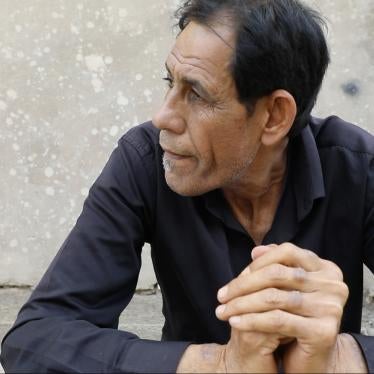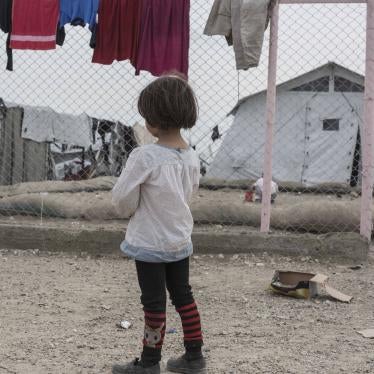George W. Bush's term as president is coming to an end, and he has little to show by way of meting out justice for the terrorist attacks of 9/11. Perhaps this is why his administration seems so desperate to score a victory on the judicial battleground of the military commissions. That its target is Omar Khadr, a child soldier at the time of the alleged offenses, makes the spectacle all the more pathetic to the observer, and tragic for Khadr.
The charges against Khadr include "murder in violation of the laws of war," and providing material support to the enemy. The most serious allegation against him is that on July 27, 2002 in Afghanistan, he threw a grenade that killed US soldier Sergeant Christopher Speer. Indeed, until a few months ago, the official story went unchallenged in the public domain. Thanks to an inadvertent government leak, we have since learned of evidence supporting at least two alternate scenarios, namely that another combatant might have thrown the grenade or that Sgt. Speer was killed by "friendly fire."
None of those questions, however, were the subject of the October 22 pre-trial hearing. Most of the time was consumed by arguments about scheduling of the actual trial. The prosecution accused the defense of what, in hockey parlance, is called "ragging the puck": stalling until the game is over. They cite defense counsel Lt. Cmdr. William Kuebler's efforts to petition the Canadian government to seek the repatriation of its citizen (as every other industrialized country has done with respect to Guantanamo detainees) as evidence that the defense has no interest in proceeding to trial, and every intention of delaying the onset of the trial indefinitely in the hopes of an eventual political resolution. The defense counters that it is unable to prepare properly for trial because the prosecution has systematically refused to fulfill its obligations to disclose relevant and exculpatory evidence.
The prosecution has also criticized the defense for wanting to obtain a psychological evaluation of Khadr by independent experts, rather than relying the government's own professionals.
Arguments about delay are standard fare in ordinary litigation, and it is symptomatic of a military commission that is both like and unlike a normal trial. In a normal trial, it would not be unusual for the prosecution to accuse the defense of using discovery as a fishing expedition, and to suggest that the defense has no reasonable basis for requesting the information. In the Khadr hearing, the prosecution argued that the defense was engaging in just such a fishing expedition by seeking access to the intelligence interrogators who interviewed Khadr at Bagram Air Base in Afghanistan and at Guantanamo Bay.
Here is how the argument went: the prosecution stated that it intends to rely at trial solely on statements made by Khadr to law enforcement interrogators, not to intelligence interrogators. Therefore, defense does not need access to the intelligence interrogators, and their evidence is irrelevant.
The defense's main response was that, before and after Khadr was interrogated by law enforcement officials (under relatively benign conditions), he was subject to coercion (including possibly cruel, inhuman, and degrading treatment and torture) by intelligence interrogators. This experience of recent past abuse and the fear of imminent future abuse by intelligence interrogators would have saturated the environment within which Khadr was interrogated by law enforcement officials. On this theory, statements made by Khadr to law enforcement officials could not be construed as free from coercion, in light of Khadr's past interrogation and fear of future interrogation at the hands of intelligence interrogators. These interrogators included the notorious Sgt. C, who was subsequently implicated in the torture and murder of another detainee around the same time. Therefore, discovery of the intelligence interrogators was crucial to establishing a foundation for a motion to suppress certain statements Khadr made during interrogation.
The prosecution's reply? That defense counsel's position regarding the use of coercive techniques by intelligence interrogators was mere speculation and assertion without factual support. So, the motion to obtain discovery of seven intelligence interrogators who interviewed Khadr during three discrete periods (Bagram in July-August 2002, Guantanamo Bay in October 2002 - February 2003, and late 2004) was an overly broad request built on unsubstantiated conjecture that intelligence personnel employed coercive interrogation techniques against detainees. Only at Guantanamo Bay could a lawyer be heard to make such an assertion without a trace of irony.
This is not a normal trial.
The other issue argued before the judge, Col. Patrick Parrish, is more complex, and exposes the incoherence produced by a legal order designed not to produce justice, but to secure convictions. The question was whether murder committed by an "unlawful enemy combatant" is automatically a war crime, or whether something more is required to turn murder into a violation of the laws of war.
Under the Geneva Conventions, members of a state's armed forces who kill enemy combatants on the battlefield may not be prosecuted for murder under the domestic laws of the enemy state. That protection is called the "combatant's privilege". Individuals who take up arms that are not part of a state's armed forces, so-called unlawful (or, more properly, unprivileged) combatants, enjoy no such immunity from domestic criminal prosecution. This means that the US government could have charged Khadr under US criminal law and tried him in a US federal court. The government chose not to do so.
Khadr was instead charged under the Military Commissions Act with murder and attempted murder "in violation of the laws of war." While it is not a war crime to kill an enemy combatant on the battlefield, the prosecution insists that it becomes a war crime - a serious violation of the laws of armed conflict - if committed by an unlawful enemy combatant. Defense counsel Rebecca Snyder argued that a battlefield killing only becomes a war crime when a combatant - privileged or otherwise - targets a person with protected status, or uses prohibited methods of killing. Protected persons include civilians, all persons in custody, incapacitated military personnel, or military medical or religious personnel. Prohibited methods include the use of human shields, poison gas, or intentional deception designed to induce the enemy into believing that one is a protected person (which is known as perfidy). Therefore, unless the prosecution can prove beyond a reasonable doubt that Sgt. Speer was a protected person when killed (which the prosecution does not contend), or that Khadr used prohibited methods of killing (which has also not been argued), his alleged actions could not constitute murder "in violation of the laws of war" even if he were an unlawful enemy combatant at the time.
The prosecution seems to claim that international law does not matter. It claims that Congress can create a new war crime under US law - and has in the Military Commissions Act - even if it has never been considered a war crime under international law in this century or the last.
Arguing that all acts of war by unlawful combatants are by definition war crimes points toward the "heads I win; tails you lose" quality of the Military Commissions process. Khadr is a combatant when it comes to detaining him indefinitely (even if acquitted of the charges against him), but not when it comes to providing him the privileges and immunities of combatants. He is a criminal defendant when it comes to charging him with murder, but not when it comes to furnishing him with the rights and protections due to anyone charged with a crime.
One status that Khadr can claim unambiguously is his Canadian citizenship. Yet Canada has thus far failed to regard him as a citizen entitled to the protection of his state. It has failed to demand his fair treatment, failed to insist that he be tried in a fair process, and failed to seek his repatriation absent compliance with these requests. Canada, it seems, is missing in action.
The trial of Khadr before the Military Commission is now scheduled to commence on January 26, six days after the inauguration of the next US president. Both candidates have vowed to bring to an end the disastrous experiment in injustice that is Guantanamo Bay. Canadian Prime Minister Stephen Harper has remained steadfastly impervious to the growing chorus of Canadians who deplore the continued detention of Khadr in Guantanamo Bay and call upon Prime Minister Harper to seek his repatriation. Harper has preferred instead to follow docilely in the trench dug by the current US president. Perhaps the most viable hope for Khadr is that the next US president will swiftly honor his commitment to close Guantanamo Bay and that Harper will continue to defer to his US counterpart.
Audrey Macklin is a law professor at the University of Toronto. She was observing the military commissions last week for Human Rights Watch.








